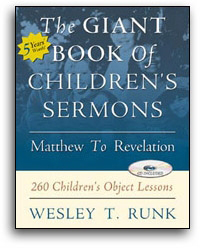The Great Picnic
Children's sermon
The Giant Book Of Children's Sermons
Matthew To Revelation
Object: a basketful of pieces of broken bread
Good morning, boys and girls. How many of you have heard of the time that Jesus fed 5,000 people with just a couple of loves of bread and some fish that a little boy had in his basket? (let them answer) We call that happening a miracle. No one else could have done this, except for Jesus, and he did it several times. We can't explain it and we don't even try to. All we know is that a lot of people were with him one day at supper time and no one had anything to eat. The disciples wanted to send the people away, but Jesus told them that they should invite the people to stay and be fed. It seemed impossible to feed that many, but they knew that Jesus could do some amazing things, so they invited the people to sit down and wait for something to happen.
Jesus sent the disciples out to find whatever little bit of food they could and bring it back to him. They found one little boy whose mother had packed him a lunch of bread and fish. When the disciples came back with it, Jesus took the bread and fish and thanked God for it and then broke it up into little pieces. Each disciple was given some of the pieces to give to all of the people who were there. Each person thanked the disciples and then ate all that he wanted. Some of the people took more than they could eat at first because they were afraid that there might not be enough. But as the disciples kept going to each group of people and giving them the bread and fish, there was more than when they started. Pretty soon everyone had enough to eat and still there was some left.
Jesus told the disciples to take and basket and collect the leftovers. They went out and people started putting back what they could not eat. Do you remember that they started with only five loaves of bread and two fish? When the disciples came back, there were twelve baskets full of bread and fish left over. What a picnic! No one had ever been to one like it before. Can you imagine what it must have been like to have been there that day with Jesus? You would never forget it, would you? (let them answer)
The next time you sit down to your table and you see bread in a basket, perhaps you will think about the day that Jesus showed the power of God with a great picnic lunch.
Good morning, boys and girls. How many of you have heard of the time that Jesus fed 5,000 people with just a couple of loves of bread and some fish that a little boy had in his basket? (let them answer) We call that happening a miracle. No one else could have done this, except for Jesus, and he did it several times. We can't explain it and we don't even try to. All we know is that a lot of people were with him one day at supper time and no one had anything to eat. The disciples wanted to send the people away, but Jesus told them that they should invite the people to stay and be fed. It seemed impossible to feed that many, but they knew that Jesus could do some amazing things, so they invited the people to sit down and wait for something to happen.
Jesus sent the disciples out to find whatever little bit of food they could and bring it back to him. They found one little boy whose mother had packed him a lunch of bread and fish. When the disciples came back with it, Jesus took the bread and fish and thanked God for it and then broke it up into little pieces. Each disciple was given some of the pieces to give to all of the people who were there. Each person thanked the disciples and then ate all that he wanted. Some of the people took more than they could eat at first because they were afraid that there might not be enough. But as the disciples kept going to each group of people and giving them the bread and fish, there was more than when they started. Pretty soon everyone had enough to eat and still there was some left.
Jesus told the disciples to take and basket and collect the leftovers. They went out and people started putting back what they could not eat. Do you remember that they started with only five loaves of bread and two fish? When the disciples came back, there were twelve baskets full of bread and fish left over. What a picnic! No one had ever been to one like it before. Can you imagine what it must have been like to have been there that day with Jesus? You would never forget it, would you? (let them answer)
The next time you sit down to your table and you see bread in a basket, perhaps you will think about the day that Jesus showed the power of God with a great picnic lunch.


